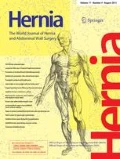Abstract
Purpose
We sought to review the presentation, diagnosis, and outcome of a series of children with late-presenting, congenital diaphragmatic hernias (CDH).
Methods
Bochdalek and Morgagni hernias that were diagnosed after 30 days of age, between January 1989 and December 2009, were reviewed retrospectively. A medical record review and telephone survey were conducted in 2010.
Results
Thirty-one subjects, diagnosed with CDH between 45 days and 13 years of age (mean, 16 months), were reviewed. Bochdalek hernias were present in 18 (58%) and Morgagni hernias in 13 (42%). There were twenty (64%) left-sided, eight (26%) right-sided, and three (10%) bilateral CDH. Five (16%) had other congenital anomalies. Eight (25.8%), including a subject with strangulated intestine that required resection, were initially misdiagnosed, due mostly to failure to obtain or correctly interpret a chest radiograph. Thirty (97%) were repaired by an abdominal approach, including seven laparoscopic closures. Follow-up ranged from 1 to 20 years (median, 7 years). All subjects survived without recurrence. Unlike neonatally diagnosed CDH, neither right-sided hernia, patch repair, nor associated esophageal atresia predicted morbidity.
Conclusion
Although diagnostic delays may lead to morbidity, if late-presenting CDH are expeditiously identified and repaired, their outcome is very good, in contrast to those that present in neonates.



Similar content being viewed by others
References
van den Hout L, Reiss I, Felix JF et al (2010) Risk factors for chronic lung disease and mortality in newborns with congenital diaphragmatic hernia. Neonatology 98:370–380
Kitano Y, Lally KP, Lally PA (2005) Congenital diaphragmatic hernia study group. Late presenting congenital diaphragmatic hernia. J Pediatr Surg 40:1839–1843
Mei Z, Ogden CL, Flegal KM et al (2008) Comparison of the prevalence of shortness, underweight and overweight among US children aged 0 to 59 months by using CDC 2000 and the WHO growth charts. J Pediatr 153:622–628
Malone PS, Brain AJ, Kiely EM et al (1989) Congenital diaphragmatic defects that present late. Arch Dis Child 64:1542–1544
Bedoyan JK, Blackwell SC, Treadwell MC et al (2004) Congenital diaphragmatic hernia: associated anomalies and antenatal diagnosis. Outcome related variables at 2 Detroit hospitals. Pediatr Surg Int 20:170–176
Elhalaby EA, Abo Sikeem MH (2002) Delayed presentation of congenital diaphragmatic hernia. Pediatr Surg Int 18:480–485
Weber TR, Tracy T, Bailey PV et al (1991) Congenital diaphragmatic hernia beyond infancy. Am J Surg 162:643–646
Woolley MM (1977) Delayed appearance of a left posterolateral diaphragmatic hernia resulting in significant small bowel necrosis. J Pediatr Surg 12:673–674
Berman L, Stringer D, Ein SH et al (1988) The late-presenting Bochdalek hernia: a 20-year review. J Pediatr Surg 23:735–739
Osebold WR, Soper RT (1976) Congenital posterolateral diaphragmatic hernia past infancy. Am J Surg 131:748–754
Mei-Zahar M, Solomon M, Trachsel D et al (2003) Bochdalek hernia: not only a neonatal disease. Arch Dis Child 88:532–535
Wiseman NE, MacPherson RI (1977) “Acquired” congenital diaphragmatic hernia. J Pediatr Surg 12:657–665
Fisher JC, Jefferson RA, Arkovitz MS et al (2008) Redefining outcomes in right congenital diaphragmatic hernia. J Pediatr Surg 43:373–379
Hedrick HL, Crombleholme TM, Flake AW et al (2004) Right congenital diaphragmatic hernia: prenatal assessment and outcome. J Pediatr Surg 39:319–323
Valfre L, Braguglia A, Conforti A et al (2011) Long term follow-up in high-risk congenital diaphragmatic hernia survivors: patching the diaphragm affects the outcome. J Pediatr Surg 46:52–56
van Dooren M, Tibboel D, Torfs C (2005) The co-occurrence of congenital diaphragmatic hernia, esophageal atresia/tracheoesophageal fistula and lung hypoplasia. Birth Defects Res A Clin Mol Teratol 73:53
Thakral CL, Sajwani MJ (1998) Concurrent right diaphragmatic hernia and esophageal atresia. Pediatr Surg Int 14:96–97
Diamond IR, Mah K, Kim PC et al (2007) Predicting the need for fundoplication at time of congenital diaphragmatic hernia repair. J Pediatr Surg 42:1066–1070
Peetsold MG, Kneepkens CM, Heij HA et al (2010) Congenital diaphragmatic hernia: long-term risk of gastroesophageal reflux disease. J Pediatr Gastroenterol Nutr 51:448–453
Su W, Berry M, Puligandla PS et al (2007) Predictors of gastroesophageal reflux in neonates with congenital diaphragmatic hernia. J Pediatr Surg 42:1639–1643
Tsao K, Lally PA, Lally KP (2011) Congenital diaphragmatic hernia study group. Minimally invasive repair of congenital diaphragmatic hernia. J Pediatr Surg 46:1158–1164
Arca MJ, Barnhart DC, Lelli JL et al (2003) Early experience with minimally invasive repair of congenital diaphragmatic hernias: results and lessons learned. J Pediatr Surg 38:1563–1568
Peetsold MG, Huisman J, Hofman VE et al (2009) Psychological outcome and quality of life in children born with congenital diaphragmatic hernia. Arch Dis Child 94:834–840
Author information
Authors and Affiliations
Corresponding author
Rights and permissions
About this article
Cite this article
Baerg, J., Kanthimathinathan, V. & Gollin, G. Late-presenting congenital diaphragmatic hernia: diagnostic pitfalls and outcome. Hernia 16, 461–466 (2012). https://doi.org/10.1007/s10029-012-0906-5
Received:
Accepted:
Published:
Issue Date:
DOI: https://doi.org/10.1007/s10029-012-0906-5




